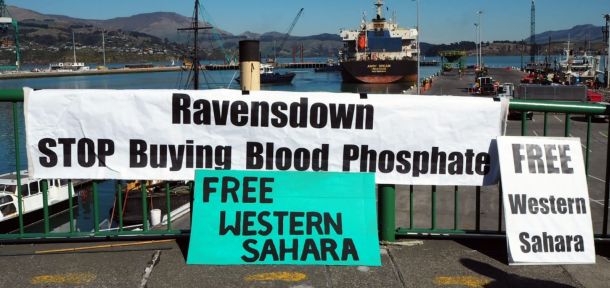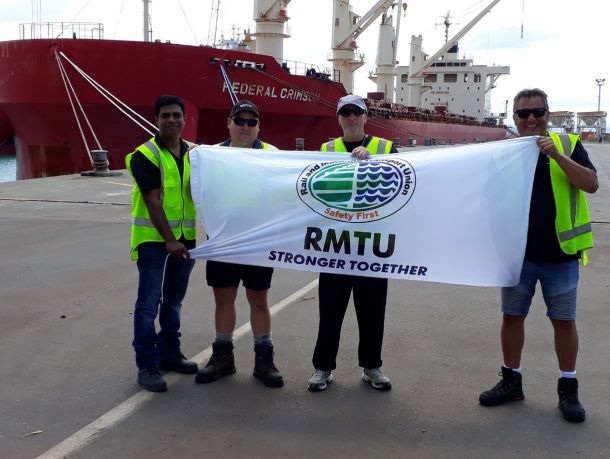
This morning, the New Zealand Rail and Maritime Transport Union issued a statement saying that they will "consider our options around refusing to berth the ship" if phosphate importer Ravensdown does not allow port workers to register their protest with the captain of the ship.
Early this morning, the bulk carrier Federal Crimson (IMO: 9732151, flag: Singapore) arrived in the port of Napier, New Zealand. On board, a cargo of about 56,000 tonnes of phosphate rock from occupied Western Sahara.
Port workers are now threatening to not allow the ship to berth in the port.

“Last month the Council of Trade Unions (CTU) passed a resolution condemning Morocco’s illegal occupation of Western Sahara and calling upon the New Zealand government to halt importation of phosphates from the area. As an affiliate to the CTU the RMTU registered our protest meeting the captain of the vessel and handing him a letter that included the CTU resolution,” said RMTU General Secretary Wayne Butson. “We have been advised that the cargo of the Federal Crimson may in fact be illegal and that under international law port workers have the right to refuse to berth or work ships carrying such cargo. Should our reasonable requests to register our protest in this manner be refused then we will consider our options around refusing to berth the ship.”
On 21 November 2019, the Rail & Maritime Transport Union (RMTU) of New Zealand had issued a press release accusing importing company Ravensdown Ltd of seemingly preferring confrontation to dialogue, as the company had flat-out refused “to allow port workers to register their protest at the importing of Blood Phosphate from the Western Sahara”, the statement read.
It seems that the workers' vocal protests are paying off, as the company appears to be more cooperative this time around. "In fairness to Ravensdown they have been very constructive in the dialogue we have had with them. Whilst we fundamentally disagree about the importation of Blood Phosphate they have been reasonable in facilitating a lawful and safe protest", today's statement reads.
Ravensdown Ltd is one of the two farmer cooperatives in New Zealand that import phosphate rock from occupied Western Sahara - a Non-Self-Governing Territory in Northwest Africa that was brutally invaded and annexed by Morocco in 1975. To date, Morocco continues to militarily occupy three-quarters of the territory, including its phosphate reserves which are exploited to the benefit of Morocco's national treasury. The Saharawi people - living in refugee camps in Algeria or under the yoke of a brutal oppression - have not consented to the phosphate trade, as would be in line with their internationally recognised right to self-determination.
The controversial trade is documented in the annual Western Sahara Resource Watch report P for Plunder. New Zealand is one of the very few countries that are still importing the conflict mineral, after Spain, Lithuania, Australia, Colombia, Venezuela, Mexico, Canada, USA and Norway have halted the trade in recent years.
The port workers' protest comes on the back of continuous civil society protests in different ports of New Zealand, calling on both Ravensdown and Ballance Agri-Nutrients to end the import of "blood phosphate".

Morocco allocates land in occupied Western Sahara to green hydrogen investors
Morocco’s ambitions to become a global green hydrogen powerhouse are accelerating. Yet, Rabat is allocating land in a territory it does not legally own.
US eyes minerals in occupied Western Sahara
Seeking to position itself as a key supplier of strategic minerals for Western powers, Morocco has signed a new agreement with the United States that covers Western Sahara’s waters and the critical minerals harboured there.
TAQA-Moeve obtains land in occupied Western Sahara
Morocco’s push for green hydrogen has taken a decisive step forward - on territory it does not legally own.
EU-Morocco Statement: autonomy without self-determination, law without lawfulness
A joint statement that came out of last week’s EU-Morocco Association Council asks readers to believe in a fiction: that an undefined autonomy plan imposed by an occupying power can satisfy the right to self-determination, and that respect for international law can coexist with the systematic ignoring of the EU’s own highest court.



